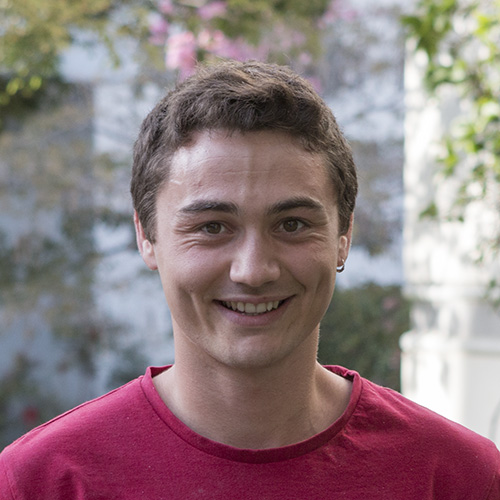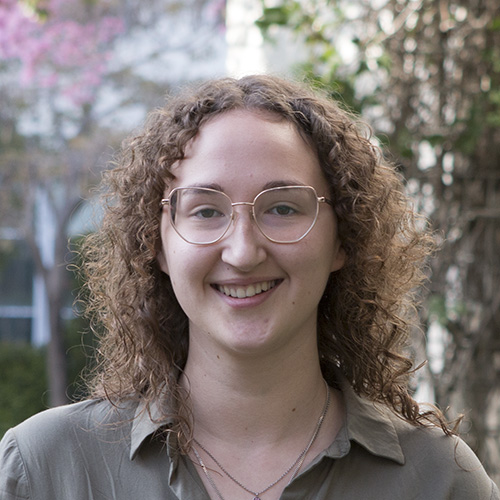 Noelia Cívico Dorado was born in Castelldefels (Barcelona) in 1998. She graduated from the Escola d’Enginyeria Barcelona Est (EEBE-UPC) in 2020, where she obtained her Bachelor’s Degree in Industrial Electronics and Automatic Control Engineering. During her junior year, she was part of PUCRA (Polytechnic University of Catalonia Robotics Association) and, throughout her first semester as a senior student, she conducted part of her studies at Fontys University in Eindhoven, the Netherlands. There, she was mainly focused on electronic and embedded systems and helped in the development of the Handex project, an exoskeleton therapy hand.
Noelia Cívico Dorado was born in Castelldefels (Barcelona) in 1998. She graduated from the Escola d’Enginyeria Barcelona Est (EEBE-UPC) in 2020, where she obtained her Bachelor’s Degree in Industrial Electronics and Automatic Control Engineering. During her junior year, she was part of PUCRA (Polytechnic University of Catalonia Robotics Association) and, throughout her first semester as a senior student, she conducted part of her studies at Fontys University in Eindhoven, the Netherlands. There, she was mainly focused on electronic and embedded systems and helped in the development of the Handex project, an exoskeleton therapy hand.
During her second semester as a senior student, she was awarded a Balsells Mobility Fellowship to pursue her Bachelor’s thesis at the University of California, Irvine. She worked with Professor Nader Bagherzadeh and his team. Her main research focus was on the design of an FPGA-based accelerator for Convolutional Neural Networks.
In 2020, she received a Balsells Graduate Fellowship to continue her academic journey as a graduate student in Computer Engineering at the University of California, Irvine. Her main research interests are computer architecture, artificial intelligence and machine learning, embedded systems and robotics. In her free time, Noelia enjoys traveling, hiking, swimming and reading.
 Hamza Errahmouni Barkam was born in Morocco in January 2nd 1998. In 2020 he received his Bachelor’s degree in Telecommunications Technologies and Services Engineering at ETSETB, UPC Barcelona with a specialization in Telematics. During the summer of his junior year, he worked at the Deloitte Cybersecurity Lab, specialized on OT systems with Andreu Bravo and Hiram Fernández Ortiz, amazing professionals whom he learnt a lot.
Hamza Errahmouni Barkam was born in Morocco in January 2nd 1998. In 2020 he received his Bachelor’s degree in Telecommunications Technologies and Services Engineering at ETSETB, UPC Barcelona with a specialization in Telematics. During the summer of his junior year, he worked at the Deloitte Cybersecurity Lab, specialized on OT systems with Andreu Bravo and Hiram Fernández Ortiz, amazing professionals whom he learnt a lot.
In his bachelor’s thesis, he worked under Prof. Marco Levorato where they improved the simulation platform called ERA that tries to emulate real communications between robots in a Gazebo world (they shared maps made from Lidar data). They migrated the software to CARLA, with more advanced sensor setups, AI & ML frameworks for self-driving software and realistic vehicles. The project also included a software defined radio to reproduce channel interference and the attenuation produced by obstacles.
In 2020, Hamza was awarded with the Balsells Fellowship so that he could pursue his PhD in Computer Sciences at the Donald Bren School of ICS. His research interests are focused on applying the new currents of Machine Learning and Artificial Intelligence towards Education and Healthcare. His current projects focus on using ML to break bias on admissions and analyze students’ performance.
He is an avid fan of basketball, personal development books, endurance sports and one of his many dreams is developing a tool to improve the school system so that future generations can focus on maximizing their true potential and find their own passions.
Marc Galobardes Esteban was born in Vic in 1998. In 2020, he graduated from UPC’s Escola Superior d’Enginyeries Industrial, Aeronàutica i Audiovisual de Terrassa (ESEIAAT), obtaining a B.S. degree in Aerospace Engineering. He was awarded in 2019 with a Balsells Mobility Fellowship to pursue his Bachelor’s Thesis in the Department of Mechanical and Aerospace Engineering at the University of California, Irvine. During his Bachelor’s Thesis, he worked as Junior Specialist with Professor Manuel Gamero-Castaño, studying the spreading of an electrospray beam.
In 2020, he was awarded a Balsells Graduate Fellowship to pursue graduate studies in Mechanical and Aerospace Engineering at the University of California, Irvine. His main research interests are microfabrication and electric propulsion.
Marc enjoys travelling and exploring through climbing, surfing and other outdoor sports.
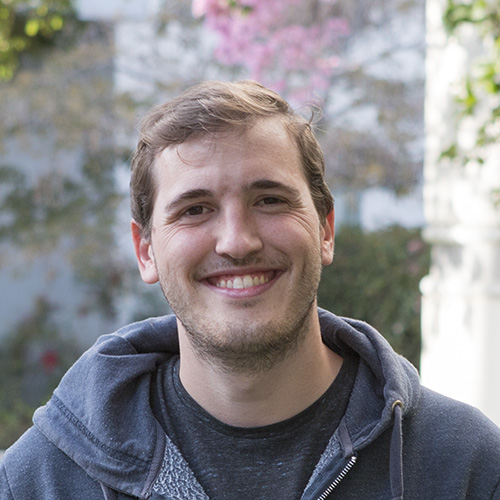 Albert Herrero Parareda was born in Barcelona in 1998. In June 2020, he received his Engineering Physics degree from the Universitat Politècnica de Catalunya (UPC). During part of his studies, he worked as an Assistant Electrical Engineer at the Material’s Lab in the Technical Architecture Faculty of the UPC with a “Beca d’Iniciació a la Recerca” (Research Initiation Grant) sponsored by the UPC.
Albert Herrero Parareda was born in Barcelona in 1998. In June 2020, he received his Engineering Physics degree from the Universitat Politècnica de Catalunya (UPC). During part of his studies, he worked as an Assistant Electrical Engineer at the Material’s Lab in the Technical Architecture Faculty of the UPC with a “Beca d’Iniciació a la Recerca” (Research Initiation Grant) sponsored by the UPC.
During his last semester (2020), he joined the group of Professor G.P. Li in the California Institute for Telecommunications and Information Technology (Calit2) with the Balsells Mobility Award. There, he worked on The Smart Worker Project as part of the Data-Engineering Think Tank and wrote his senior’s thesis: “Neural Networks as a numerical tool to solve the Electromagnetic Field in an enclosed space”.
In 2020, Albert was granted a Balsells Graduate Fellowship and continued his academic journey as a graduate student in the Electrical Engineering and Computer Science at the University of California, Irvine under the supervision of Professor Capolino. His main research interests are Photonics and Micro- & Nanooptic devices with Exceptional Points of Degeneracy (EPDs).
He enjoys travelling, playing sports, and reading.
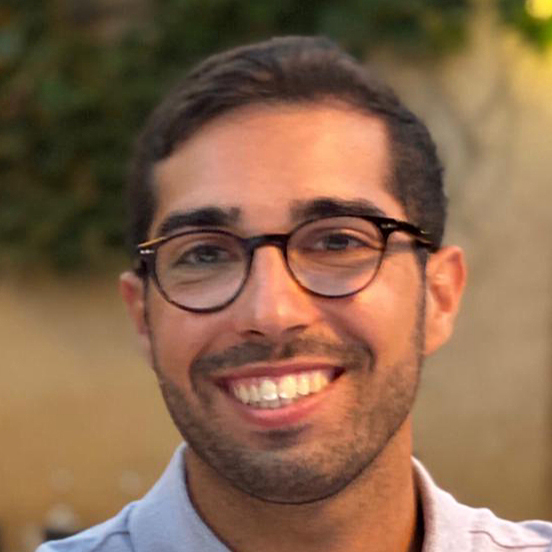 Héctor Pascual Herrero was born in Barcelona in 1998. In June 2020, he received his Bachelor’s degree in Engineering Physics from Escola Tècnica Superior de Telecomunicacions de Barcelona (ETSETB) at Universitat Politècnica de Catalunya (UPC).
Héctor Pascual Herrero was born in Barcelona in 1998. In June 2020, he received his Bachelor’s degree in Engineering Physics from Escola Tècnica Superior de Telecomunicacions de Barcelona (ETSETB) at Universitat Politècnica de Catalunya (UPC).
In 2019, he was awarded a Balsells Mobility Fellowship to conduct his Bachelor’s thesis at the University of Colorado at Colorado Springs. He joinedthe group of Professor Xin Yee to develop a new supervised dimension reduction method, “least squares regression principal component analysis” (LSR-PCA), which aims to reduce the computational cost of quantum mechanical calculations.
In 2020, Héctor was awarded a Balsells Graduate Fellowship to pursue graduate studies in Materials Science and Engineering at the University of California, Irvine. His main research interests include the study of nanoscale systems that have applications in nanoelectronic devices and nanophotonics.
In his spare time, Héctor loves practicing sports like surfing and skiing, as well as cooking and playing the piano.
 Jordi Ventura Siches was born in Barcelona in 1996. In 2014, he started his B.S. in Air Navigation Engineering at UPC’s Escola d’Enginyeria de Telecomunicació i Aeroespacial de Castelldefels (EETAC). When he was a Sophomore, he decided to enroll in the double degree, on Telecommunication Systems Engineering.
Jordi Ventura Siches was born in Barcelona in 1996. In 2014, he started his B.S. in Air Navigation Engineering at UPC’s Escola d’Enginyeria de Telecomunicació i Aeroespacial de Castelldefels (EETAC). When he was a Sophomore, he decided to enroll in the double degree, on Telecommunication Systems Engineering.
In 2019, he was granted a Balsells Mobility Fellowship to conduct his Bachelor’s thesis at the University of California, Irvine, under the advice of Prof. Haithem Taha. His research consisted in testing the control capabilities of an aircraft model in a wind tunnel, to study the implementation of a novel roll mechanism at stall regime.
Back in Barcelona, Jordi completed an MS in Advanced Mathematics and Mathematical Engineering at UPC’s Facultat de Matemàtiques i Estadística (FME). His Master Thesis, under the supervision of Professors Sonia Fernandez-Mendez and David Codony, was based on the computational modelling of 4th order PDE’s using Finite Elements Method, and its main conclusions can be found in the paper “A C0 interior penalty finite element method for flexoelectricity”.
In 2020, he was awarded a Balsells Fellowship to pursue graduate studies in Mechanical and Aerospace Engineering. His main research interests are control theory, flight dynamics and mathematical modelling. In his free time, Jordi enjoys travelling, cooking, playing the guitar and reading.
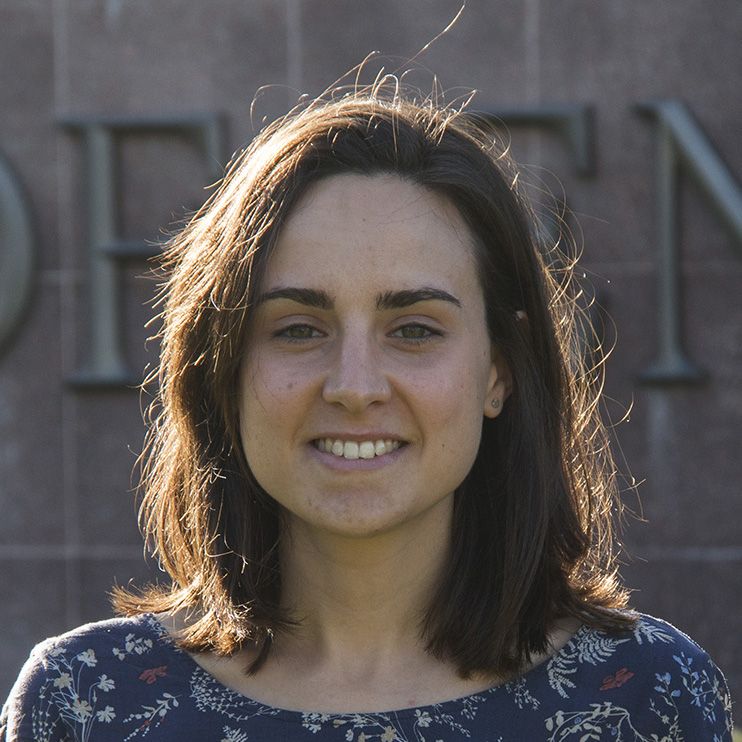 Rebeca Zafra Polonio was born in Vic, Barcelona, in 1995. In 2020, she graduated from Escola Superior d’Enginyeries Industrial, Aeroespacial i Audiovisual de Terrassa (ESEIAAT) at the Universitat Politècnica de Catalunya (UPC) with two Bachelor’s Degrees, Industrial Design and Product Development Engineering and Mechanical Engineering.
Rebeca Zafra Polonio was born in Vic, Barcelona, in 1995. In 2020, she graduated from Escola Superior d’Enginyeries Industrial, Aeroespacial i Audiovisual de Terrassa (ESEIAAT) at the Universitat Politècnica de Catalunya (UPC) with two Bachelor’s Degrees, Industrial Design and Product Development Engineering and Mechanical Engineering.
During her junior year, she was selected to participate in the Creative Lab Program at the UPC in collaboration with the Seat-Volkswagen Group, focused on facing the future challenges of the transport industry. In this program, she developed her project within the context of future mobility models and designed and implemented a new product concept to improve car-sharing services, for which she received industrial patent rights in 2019. During this period, she also conducted a 1-year internship at the multinational company Tous Jewelry where she worked as a Product Design and Development Assistant, being in charge of design standardization for mass production and manufacturing processes.
In 2019, she received a Balsells Mobility Award to conduct her bachelor’s thesis in Mechanical Engineering at the University of California, Irvine. Under the advice of Professor Roger Rangel, she joined the HyperXite research group and centered her thesis on FEM simulation to validate the design of mechanical components of a half-scale Hyperloop model, focusing on its vibrations analysis. During the rest of her senior year, she continued exploring the Hyperloop concept in the industrial design field, and wrote her second bachelor’s thesis: “Interior Design and User Experience of a passengers’ Hyperloop pod”.
In 2020, Rebeca was awarded a Balsells Fellowship to pursue a Professional Master’s in Engineering with a concentration in Mechanical and Aerospace Engineering in the specialization of Nanotechnology at the University of California, Irvine. Her research interests mainly focus on interdisciplinary areas, from consumer product design and user experience design based on social behavior trends to smart mobility models and transportation. She is also interested in new developments in materials and manufacturing, such as fabrication and design of nanomaterials or additive manufacturing techniques, and its impact on the industry.
In her free time, she enjoys traveling and learning from different cultures, reading, cooking, and practicing outdoor sports.

